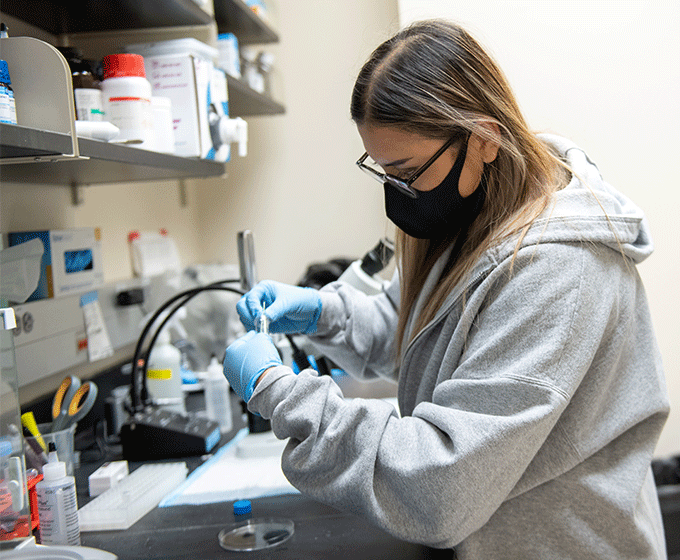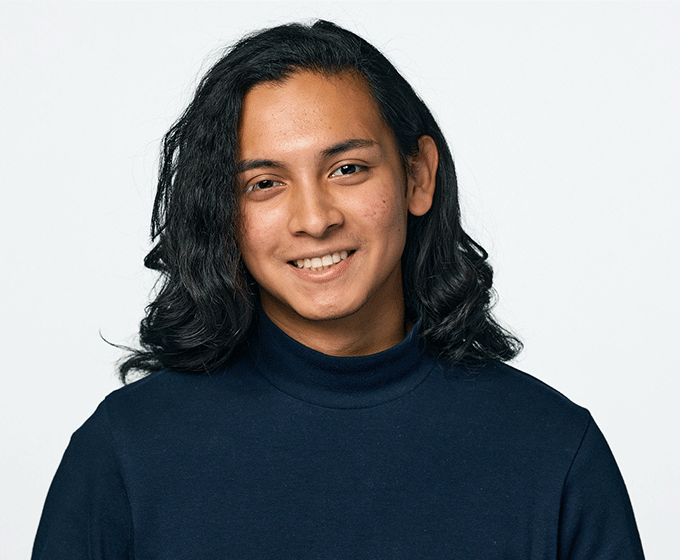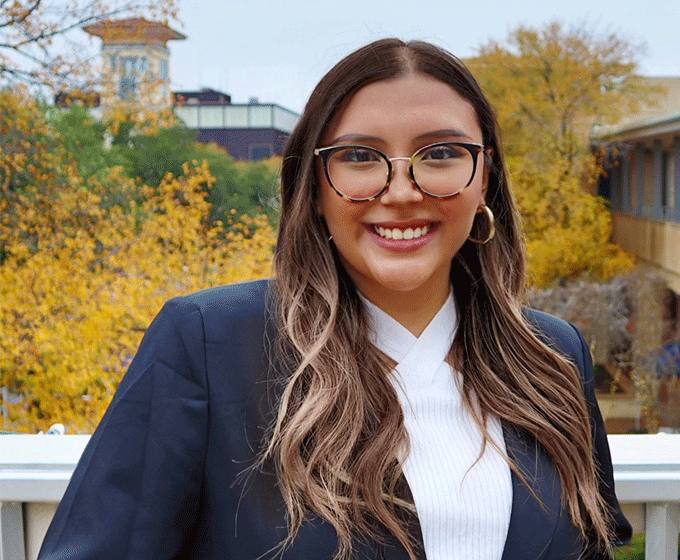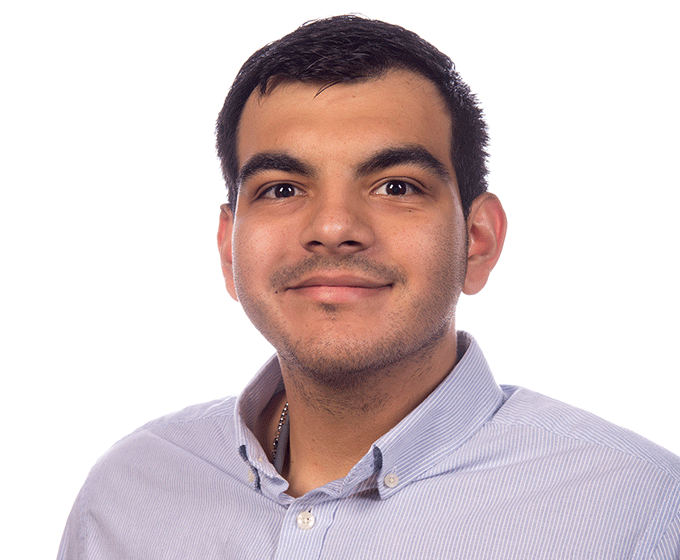
Undergraduate student Samantha Oviedo, a Barry Goldwater Scholar, works in the lab of UTSA professor Lindsey Macpherson. After graduation, she plans to become a principal investigator in her own biomedical research lab.
MAY 23, 2023 — This spring and summer semesters, a record 21 UTSA undergraduate and graduate students from the MARC (Maximizing Access to Research Centers) and RISE (Research Initiative for Scientific Enhancement) programs will cross the stage to build their careers in San Antonio and beyond. Many of these undergraduates have been accepted into nationally recognized doctoral programs, and the doctoral students who are graduating will begin lifelong careers in research.
“RISE and MARC are training programs that prepare STEM students from underrepresented backgrounds to continue their education into a doctoral program and start a research career,” said Gail Taylor, MARC and RISE assistant program director at UTSA. “The programs are extremely pleased to have worked with so many amazing UTSA students, whom we have helped to grow into young researchers who stand out on a national level. Our training team has over 100 years of combined experience in helping students reach their educational and career milestones.”
MARC supports undergraduates who are seeking a doctorate in the biomedical or behavioral sciences. The current version of the program debuted in January 2022 and is more rigorous than past iterations with increased emphases on rigorous experimental design and thesis development and presentations, which they will encounter in doctoral training. MARC has been recognized for its notable success in helping undergraduate students pursue master’s and doctorate degrees. Over 90% of the 36 students who participated in recent years were admitted to graduate programs and 83% to doctoral programs.
RISE is a federally funded program that aims to increase the number of underrepresented faculty, students, and investigators who are performing research in the biomedical sciences. The program was founded in 2000 and has funded undergraduate and doctoral student research. RISE is currently in its last year due to UTSA’s designation as Top Tier research institution. The associated increases in research funding from this classification prevent the university from qualifying for RISE in the future.
In place of RISE, UTSA will be introducing IMSD (Initiative for Maximizing Student Development) this fall. IMSD is a three-year research professional development program that supports bioscience doctoral students from diverse backgrounds as they work to advance their scientific careers. IMSD Programs are active at many of the top schools in the nation.
With the upcoming sunset of the RISE program, UTSA is taking a moment to highlight some who are beginning the next chapter of their research careers:

Joshua Chaj Ulloa
Undergraduate, Chemical Engineering
Ulloa’s research interests lie in personalizing health care through advanced biosensing technology. His studies involve human anatomy and the biological and molecular mechanisms of sweat and other biomarkers that can be used by biosensors to detect the early development of diseases. This technology would allow individuals to better understand their body’s needs and improve their wellbeing rather than wait for illnesses to become physically noticeable, which typically occurs during advanced stages of a disease that is often either severe or irreversible.
“The RISE program allowed me to gain confidence as a young scientist, through their workshops, invited speakers, and funding opportunities to attend conferences,” Ulloa said. “I've gained priceless knowledge to aid me throughout my future career.”
During his time at UTSA, Ulloa worked in the lab of Jingyong Ye, professor in UTSA's Margie and Bill Klesse College of Engineering and Integrated Design, where he assisted on developing functional biosensors that would provide early detection of heart attacks within a clinical setting. Additionally, Ulloa has conducted research at the Wake Forest School of Medicine, the Mayo Clinic, and MIT on similar devices to detect and prevent diseases before they occur. This fall, he will begin his doctorate at the California Institute of Technology in their joint Medical and Electrical Engineering Program.

Samantha Oviedo
Undergraduate, Biochemistry
Oviedo was a researcher in the lab of Lindsey Macpherson, assistant professor in the COS Department of Neuroscience, Developmental and Regenerative Biology, where she worked on several projects, including an undergraduate honors thesis that investigated the molecular interactions between bitter taste receptors and G proteins, a group of proteins that act as switches and transmit signals from bitter tasting stimuli. There is a need in the pharmaceutical industry to develop formulations that will reduce the bitterness present in many medications so that certain populations like the young and elderly will have less resistance to taking them.
“I joined my very first research lab at UTSA, which profoundly changed the way I perceived science and sparked my passion for pursuing a career path as a researcher,” Oviedo said. “Since I began my journey conducting scientific research nearly four years ago, I have become enamored with the prospect of discovering something new that will make a positive impact on improving human health.”
Oviedo is a Barry Goldwater Scholar, former president of the American Chemical Society Student Affliliate UTSA Chapter, and recipient of the 2022 Dean’s Fund for Excellence Award. After graduation, she plans to one day become a principal investigator in her own biomedical research lab and find ways to promote STEM initiatives that focus on making science more accessible to underserved communities. This fall, she will begin doctoral training in biophysics at the Scripps Institute.

Matthew Lopez
Doctoral, Neurobiology
Lopez conducts research that seeks to understand how the brain forms memories on a cellular level and how cellular changes occur over time that could impact the accuracy of memories.
He’s performed his research in collaboration with Isabel Muzzio, former professor in the Department of Neuroscience, Developmental and Regenerative Biology (now at the University of Iowa), whose research focuses on behavioral neuroscience, learning and memory, and stress and emotions.
“The RISE program has helped me immensely and I credit it for making my doctoral degree possible,” Lopez said. “The program funded my doctoral degree, helped me attend research conferences, network with other scientists, and provided education on leadership and finance.”
Through the RISE program, Lopez has showcased his research to faculty and peers across multiple formats, which included a poster presentation and three-minute thesis competition. After he graduates this summer, Lopez plans to continue his scientific career as a post-doctoral fellow. In addition, he hopes to mentor younger researchers and promote diversity in science.
UTSA Today is produced by University Communications and Marketing, the official news source of The University of Texas at San Antonio. Send your feedback to news@utsa.edu. Keep up-to-date on UTSA news by visiting UTSA Today. Connect with UTSA online at Facebook, Twitter, Youtube and Instagram.
Move In To COLFA is strongly recommended for new students in COLFA. It gives you the chance to learn about the Student Success Center, campus resources and meet new friends!
Academic Classroom: Lecture Hall (MH 2.01.10,) McKinney Humanities BldgWe invite you to join us for Birds Up! Downtown, an exciting welcome back event designed to connect students with the different departments at the Downtown Campus. Students will have the opportunity to learn about some of the departments on campus, gain access to different resources, and collect some giveaways!
Bill Miller PlazaJoin us for an intimate evening of cocktails, conversation, and culinary inspiration with Pati Jinich, Emmy-nominated chef and James Beard Award-winning author. Enjoy light bites and signature drinks in the warm, modern setting of Mezquite as Pati connects with guests over her passion for Mexican cuisine and storytelling.
Mezquite Restaurant in Pullman Market, 221 Newell Ave., San Antonio 78215From inspired courses to thoughtful pairings and a rich sense of community, the Ven a Comer Signature Dinner is a night of shared meals, shared stories, and unforgettable flavor.
Stable Hall (Pear Brewery), 307 Pearl Pkwy, San Antonio 78215Come and celebrate this year's homecoming at the Downtown Campus with food, games, giveaways, music, and more. We look forward to seeing your Roadrunner Spirit!
Bill Miller PlazaThe University of Texas at San Antonio is dedicated to the advancement of knowledge through research and discovery, teaching and learning, community engagement and public service. As an institution of access and excellence, UTSA embraces multicultural traditions and serves as a center for intellectual and creative resources as well as a catalyst for socioeconomic development and the commercialization of intellectual property - for Texas, the nation and the world.
To be a premier public research university, providing access to educational excellence and preparing citizen leaders for the global environment.
We encourage an environment of dialogue and discovery, where integrity, excellence, respect, collaboration and innovation are fostered.